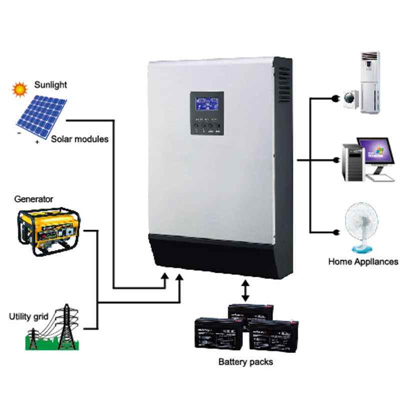News
News
Don't Let Your Inverter Becomes An Orphan
Time:[2019-12-16] Views:2101
SunKo technical engineers often encounter such problems, many users installed photovoltaic power stations, and they can take good care of solar panels like a baby. Unfortunately, the inverters become an orphan were ignored when inverters sounds and lights alarm attract their attention but they keep a “set and forget” sort of deal.
Don't let your inverter becomes an orphan, SunKo technical Engineers advise that here are four best things you can do to look after your solar inverter.
1. Look out for warning lights
Each inverter has three alarm lights represent that GFCI warning, inverter states light, and alarm. SunKo inverters now can sort out minor problems and glitches themselves, but more serious problems, or minor problems that often lead to more serious hassle, will elicit a cry for help. As soon as you see any lights, read your manual to see if you can fix it or whether you have to call SunKo technical engineers to solve it.
2. Listen out for noises
In order to attract many users' attention, we have added sound alarm function on each inverter. If you’re hearing any sound alarm, any funny noises (especially if there’s a warning light too), then you need to take further steps - either work through the manual or call someone in. Sometimes, your inverter will work away quietly 99.99% of the time.
3. Watch inverter performance
Watching your inverter’s performance is the best way to make sure it’s healthy. SunKo inverter’s has 4’LCD that displays the updates of energy, power, input information, warning information, etc, so that you can see how much energy your system is producing. Knowing what to expect on a daily, weekly, monthly and seasonal basis means you’re able to see shortfalls rapidly and take action.
4. Check the data
SunKo technical engineers advised that you should also compare your output with the data supplied to you by your installer or manufacturer. If you’re finding you’re always much lower than your estimated energy production then there may be a physical reason, like shady trees or an obstructive building.
It’s not always about looking for problems with the inverter itself, there are often external reasons for less-than-optimal outputs and these can sometimes be eliminated or improved upon.
As a user, please don't let your inverter becomes an orphan, it needs to be looked after well. If you do over four best things to look after your inverter, we think photovoltaic power station will bring you an endless surprise.




